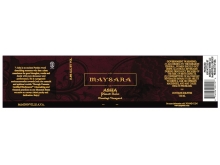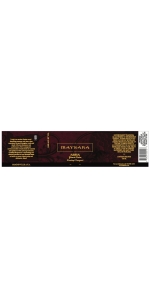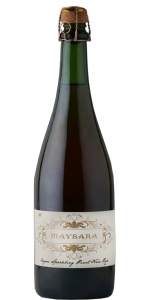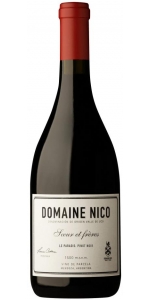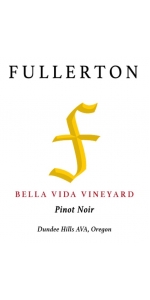Maysara Asha Pinot Noir 2016
6 bottles with free shipping for: $360.00
12 bottles with free shipping for: $660.00
| BUY MORE! SAVE MORE! | ||||||||||||||||||||
|
| Country: | United States |
| Regions: | Oregon Oregon (Willamette) |
| Winery: | Maysara Winery |
| Grape Type: | Pinot Noir |
| Organic: | Yes |
| Vintage: | 2016 |
| Bottle Size: | 750 ml |
Maysara Asha Pinot Noir is made from 100 percent Pinot Noir
22 months in 40% new French oak barrel
Asha is an ancient Persian Word describing one who has a clean conscience for good thoughts, words, and deeds with a pure demeanor and performance.
A bejeweled glassful of garnets, Asha snakes onto your palate with amarena cherries, clove and a tantalizing whisp of … what is that? A distant campfire? Elegant and slippery tannins sway to a tune played upon vanilla violins.
At Maysara Winery & Momtazi Vineyard, we are committed to cap-turing the complete expression of our land and conveying it to you through superior quality in every bottle. We practice only low-impact, holistic farming methods in our Demeter Certified Biodynamic Vineyard. We are confident these practices are the best way to capture the true essence of the soil in our fruit and ensure health of our vines and the unique accent of our terroir for generations. This philosophy is carried into the cellar, where Demeter Certified Biodynamic wine-making practices produce wines with intensity, sophistication and elegance while maintaining a purity of both fruit and earth.
Pair with dishes that utilize slow braised meats, something with complex layers of spices and caramelization, as the mid-palate is ensorcelled with lively acidity and don't forget those tannins!
Maysara winery is nestled in the foothills of the McMinnville AVA, in Oregon's Willamette Valley. The Momtazi family is dedicated to biodynamic farming practices. What makes Maysara unique is that there is over 600 feet elevation gain in the vineyards. From the property's lowest point at 120 feet to around 600 feet, the soil is clay and loam based (similar to most of the valley). From 600-780 feet, there is Jory soil (a red earth loaded with iron and mineral deposits). Quite a bit of the McMinnville AVA has this top soil. What makes this part of Maysara's vineyard special is that there's 10 feet of this earth before the base of loam and calcareous sub-soil.
Maysara Wines reflect this commitment to terroir, showing a purity of fruit and earth, that are true to the soils from which they come.
On April 1st, 1997, Moe and Flora Momtazi bought 496 (of the now 532) acres of abandoned wheat farm just south of their home in McMinnville, Oregon. Though wild and untouched, Moe’s vision for the Momtazi Estate was born looking out across the thriving hills of land that had been free of chemicals for seven years.
Though using chemicals would have been faster and more economical while building infrastructure and reclaiming the land, not a single one has or will be used throughout the estate. Instead, the ground was turned over multiple times during the summer of 1997 in order to eliminate unwanted plants and weeds while returning the soil to a usable state.
They began planting in March of 1998, with 13 acres of self-rooted pommard pinot noir vines. After months of researching the relationships between specific pinot noir clones, rootstocks and the different soil types found across the estate, over 120,000 plants were grafted in the greenhouses and planted in the vineyard by the end of the summer in 1999.
They believe that 90% of winemaking takes place in the vineyard. Because of this, they have held themselves to a strict form of land use acting as stewards of the land in order to nurture and reap the rewards naturally. Their alternative approach to chemical use is growing a variety of medicinal and dynamic flowers and herbs that they make into compost teas. By steeping into teas, they’re able to harness the beneficial properties of each flower and herb and embody a “from nature to nature” philosophy. As such, their multiple compost piles and Biodynamic preparations are extremely important for their vineyards because the resulting humus is worked into their vineyard in order to achieve long-term soil and vine health.
Their unique niche in the foothills of Oregon’s Coast Range separates them from valley weather influences providing warmer days and cooler nights with less precipitation during the harvest season. The property has highly diversified soil types consisting primarily of Nekia and Yamhill series, laced with veins of Peavine and Jory. By training their vines to produce between 1.75-2.25 tons per acre, they believe they are getting the best fruit possible from their unique terroir.
BIODYNAMICS
Biodynamics is an ultra-organic way of farming stemming from the two words; biological and dynamic. The biological aspect is practiced throughout organic farming and includes; composting, cover cropping, green manuring, cultivation, companion planting and integration of animals throughout the farm. The dynamic effects are extremely important, maybe even more-so than the biological. They include planning and planting by a calendar (i.e. near and far stars), Biodynamic composting, peppering and radionics, along with homeopathy. Therefore, both the biological & the dynamic effects are practiced and implemented.
In Biodynamics the farm is considered a living organism — having its own individuality and soul. As such the farm is believed to be sick if it imports any fertilizer from the outside; therefore being self sufficient is an important part of Biodynamic farming. Soil is considered to be the foundation of agriculture, therefore enriching the soil is an important task. A farmer is comparable to the conductor of an orchestra — bringing all the individual forces and energies into harmony by playing the right notes at the right time.
We distribute our own compost, inoculated with the Biodynamic preparations and distribute it underneath the vines as needed. We have also eliminated the use of minerals which need to be mined from the earth. Instead, we grow a variety of herbs and flowers that have been used medicinally for thousands of years (i.e. Chamomile, Dandelion, Yarrow, Valerian, Horsetail, Stinging Nettle, etc.). We make teas with them to be sprayed either on the foliage (on leaf days) or injected through the irrigation line to the root system (on root days). We apply these teas in homeopathic amounts in order to maintain the vitality and healthy immune system of the plants. Plants do not need to be shocked with penicillin like treatments if they are “brought up” with healthy immunities to pests and diseases.
In the winery, we allow the native yeast found on the grape skins to naturally initiate primary fermentation. No commercial yeast or enzyme use is allowed and we do not adjust acidity or add sugar. The secondary or malolactic fermentation also occurs on its own without any additives.
MCMINNVILLE AVA
The McMinnville American Viticultural Area is a sub-appellation of the Willamette Valley, nestled in the Coast Range foothills of Yamhill County that was created in 2005 after a successful petition that began in 2002. The soils found in the McMinnville AVA are primarily made up of both sedimentary and volcanic soils such as loams and silts with an underlying base of basalt. Beneath an average of 20-40 inches of clay and soil, lies hard stone mixed with basalt pebbles and compressed sediment that gives off minerality. It’s this unique soil diversity and the location at the mouth of the Van Duzer corridor that gives the McMinnville Pinot Noirs their dark fruit flavors and spicy earth tones, while allowing whites like Pinot Gris, Blanc and Riesling to attain a bright fruit-forwardness and vibrant acidity.
Maysara Asha Pinot Noir is made from 100 percent Pinot Noir
22 months in 40% new French oak barrel
Asha is an ancient Persian Word describing one who has a clean conscience for good thoughts, words, and deeds with a pure demeanor and performance.
A bejeweled glassful of garnets, Asha snakes onto your palate with amarena cherries, clove and a tantalizing whisp of … what is that? A distant campfire? Elegant and slippery tannins sway to a tune played upon vanilla violins.
At Maysara Winery & Momtazi Vineyard, we are committed to cap-turing the complete expression of our land and conveying it to you through superior quality in every bottle. We practice only low-impact, holistic farming methods in our Demeter Certified Biodynamic Vineyard. We are confident these practices are the best way to capture the true essence of the soil in our fruit and ensure health of our vines and the unique accent of our terroir for generations. This philosophy is carried into the cellar, where Demeter Certified Biodynamic wine-making practices produce wines with intensity, sophistication and elegance while maintaining a purity of both fruit and earth.
Pair with dishes that utilize slow braised meats, something with complex layers of spices and caramelization, as the mid-palate is ensorcelled with lively acidity and don't forget those tannins!
Maysara 3 Degrees Pinot Noir is 100 percent Pinot Noir
Aged 11 months in neutral French oak barrels
3° (Three Degrees) Pinot Noir is handcrafted by the Momtazi sisters whose differing personalities; combined with elegance, finesse and balance, reflect the dynamic characteristics of the Momtazi Vineyard. The sisters, Tahmiene, Naseem and Hanna, set out to make a pinot that tastes great and has the highest quality fruit all while being affordable for everyone.
Intriguing notes of fresh earth, oak leaves and pepper are woven together in the initial impression. Lifted, verdant tannins give this wine a firm structure for the vintage to showcase its characteristic starry-eyed smile.
At Maysara Winery & Momtazi Vineyard, we are committed to cap-turing the complete expression of our land and conveying it to you through superior quality in every bottle. We practice only low-impact, holistic farming methods in our Demeter Certified Biodynamic Vineyard. We are confident these practices are the best way to capture the true essence of the soil in our fruit and ensure health of our vines and the unique accent of our terroir for generations. This philosophy is carried into the cellar, where Demeter Certified Biodynamic wine-making practices produce wines with intensity, sophistication and elegance while maintaining a purity of both fruit and earth.
Momtazi Vineyard.
A vibrant and snappy pinot that will shine and refresh when paired with curries, spetzatinas and rich stews.
Maysara Jamsheed Pinot Noir is made of 100 percent Pinot Noir
11 months in 10% new French oak barrels
According to ancient Persian legend, King Jamsheed was able to observe his entire realm by peering into his full wine goblet.
Beginning with a generous core of red-black fruits, the McMinnville AVA saunters over the palate with both bravado and grace. Blackberry and fresh cracked pepper entwine perfectly with matured and lengthy tannins on the finish. The depth of this unassuming bottling is always an adventure to mine. Some older prospectors hear tell of herbal notes… silver sage? rosemary?
At Maysara Winery & Momtazi Vineyard, we are committed to cap-turing the complete expression of our land and conveying it to you through superior quality in every bottle. We practice only low-impact, holistic farming methods in our Demeter Certified Biodynamic Vineyard. We are confident these practices are the best way to capture the true essence of the soil in our fruit and ensure health of our vines and the unique accent of our terroir for generations. This philosophy is carried into the cellar, where Demeter Certified Biodynamic wine-making practices produce wines with intensity, sophistication and elegance while maintaining a purity of both fruit and earth.
Always offering generous accessibility, pair Jamsheed with darker fowl, grilled meats or salmon, even caramelized veggies.
Maysara Sparkling Pinot Noir Rose is made from 100 percent Rose.
A stunning sparkling rosé made with 100% Pinot Noir grapes, that is balanced with high tension acidity and minerality. The fine bubbles keep the aromatics tight with a clean finish of dried cranberries, pomegranate, and wild strawberries.
Pair with soft cheeses, fried chicken, oysters, Mediterranean salads.
Domaine Nico le Paradis Pinot Noir is made from 100 percent Pinot Noir.
The cool climate vineyard that belongs to Laura and her sister Adrianna Catena feels like paradise itself to Laura. It is lined by trees and fruit orchards, with majestic views of the Andes. Inside the 12 Hectare vineyard, there is a little house with two tiny bedrooms and a kitchen, where Laura dreams of spending a whole month reading books-Laura's version of paradise. The little house is affectionately named Chateau Laura. About the Vineyard The tiny parcel where Le Paradis is grown was planted in 2011 with Dijon 667 Clones over two acres. Wine Production The grapes from this small parcel were elaborated in 15 separate microvinifications.
All the microvinifications were fermented with indigenous yeast. 20% of the microvinifications were fermented with 100% whole clusters in oak roll-fermentor of 600L and low temp (22 Celcius degrees). 40% were fermented with 20% whole cluster in small vats of 800L and 40% fermented in small vats of 800L without sulfites until 4%V/V of alcohol.
Review:
From soils rich in calcium carbonate and sand, in a vineyard 1,600 meters above sea level, this wine comes from a selection of 2.7 hectares that produced very little fruit in 2016, just barely enough to fill 800 bottles. But watch out for this white, with its edge, its minerality, those saline notes that are so characteristic of chardonnay from the chalky Gualtallary soils. The wine was aged for a year in used barrels, and it has some of the toast, but here it’s the deep minerality that dominates.
Patricio Tapia - Descorchados 96 Points
Fullerton Three Otters Pinot Noir is made from 100% Pinot Noir - 40 years old
11 months in 25% new Oak and 75% neutral
Bella Vida Vineyard is perched high in the heart of the Dundee Hills. This picturesque site provides elegant fruit from the storied Jory soils of the AVA. LIVE certified.
Aromas of cherry and raspberry flow into finely-tuned layers of cedar, cocoa, licorice, and baking spices. The palate pulses with energy as the silky tannins and gorgeous mid-palate captivate your senses. A radiant and profound experience.
A co-fermentation of Dijon clones 113, 667, and 777, this wine expresses the volcanic soils of the Dundee Hills elegantly, yet powerfully. Upon arrival, the grapes were immediately de-stemmed into an open-top two-ton fermenter. Following a seven day cold soak, the wine started fermenting slowly at a cool temperature. To manage extraction, we utilized one to two punch-downs and one pump-over per day, with two rack-and-returns at the beginning and middle of fermentation. As fermentation neared the end, the must was heated to achieve a peak temperature of 94° F resulting in optimum extraction, and then we immediately chilled the wine to extend the time on the skins, while switching to one pump-over per day to limit harsh, seed-tannin extraction. After a total of 19 days on the skins, we drained and pressed the wine, keeping the free-run and press fractions separate. This bottling contains only the free run fraction. Following two days of settling, the wine was racked to barrel and aged for 11 months in 25% new French oak and one month in tank prior to being bottled unfined and unfiltered.
Review:
Vivid red. Displays fresh red/dark berry and pungent floral aromas, along with suggestions of cola, mocha and five-spice powder. Appealingly sweet and energetic on the palate, offering intense black raspberry, cherry-cola, spicecake and rose pastille flavors that tighten up slowly on the back half. Fine-grained tannins frame the well-defined finish, which lingers with impressive, red fruit liqueur-driven persistence. (all de-stemmed fruit and 25% new French oak). - Josh Raynolds" - Antonio Galloni's Vinous (June 2019), 93 pts
- back
Just south of the winery, Bacigalupi Vineyard straddles Westside Road in the upper reach of Russian River Valley. The 125 acre vineyard encompasses a range of terroir, from heavier valley floor soil along the Russian River to alluvial clay loam on the rolling hillsides. The fruit is sourced from a superb block of 25 year-old Wente Clone vines located on the western slope of the site. Bacigalupi was the source of the Chateau Montelena Chardonnay that, famously, beat the French wines at the "Judgement of Paris" in 1976.
Bacigalupi Chardonnay has a nose of lemon zest and vanilla bean. The palate opens with red pear and Meyer lemon, and brioche toast and honey comb notes on the finish. Like well-made Chardonnay from great vineyards around the world this wine benefits from getting some air, will age for years, and is best when served chilled around 50 degrees. This wine will evolve in the bottle for many years to come. A terrific wine from one of Sonoma County's top sites for Chardonnay.
My Favorite Neighbor Cabernet Sauvignon is made from 83% Cabernet Sauvignon, 7% Petit Verdot, 7% Malbec, 2% Petit Sirah, 1% Syrah
A homage to Stephan Asseo of L’Aventure Winery became an obsession. Sourced from exceptional vineyard sites around Paso Robles, San Luis Obispo and south to Edna Valley, this wine is cultivated meticulously by the farmers who have become My Favorite Neighbors. With their dedication to the land, we are able to craft a world class wine without any shortcuts or compromises. Welcome to our Neighborhood. 2020 abundant winter rain and a long, moderate growing season allowed for extended hang times and exceptional fruit quality.
The 2021 My Favorite Neighbor Cabernet Sauvignon fills the glass with a seamless culmination of black cherry, cassis and warm spice. On the palate, you are rewarded with a full body displaying blackberry and plum with underlying notes of tobacco. An additional layer of red fruit and a pop of acid, combined with well- integrated tannins and a beautifully crafted structure, leave nothing to be desired. This is a serious wine that can be enjoyed and respected by all.
Review:
A homage to Stephan Asseo of L’Aventure Winery became an obsession. Sourced from exceptional vineyard sites around Paso Robles, San Luis Obispo and south to Edna Valley, this wine is cultivated meticulously by the farmers who have become My Favorite Neighbors. With their dedication to the land, we are able to craft a world class wine without any shortcuts or compromises. Welcome to our Neighborhood.
The 2022 My Favorite Neighbor is everything you’ve come to expect from our flagship Cabernet Sauvignon, sourced from our favorite Paso Robles growers who lend their neighborly spirit to the wine. Effusive aromas of raspberry and currant reveal notes of blue fruit and purple flower. On the palate, juicy red fruits are interwoven with hints of black cherry, cinnamon and toasted oak. Structured tannins carry into a long, chewy finish. Whether it’s a casual backyard barbecue or a fine celebratory meal, this versatile wine has you covered for summer and beyond.

